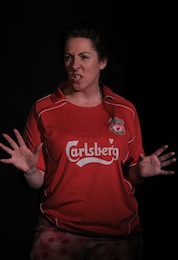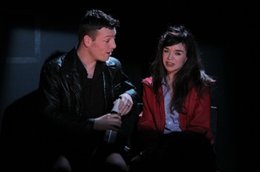Val, Tina and Bee are three contemporary Dubliners, friends united by a common desperation: the men in their lives (where there are any) are generally fat, sweaty and feckless, they haven’t “had it” for a year or more, and thrills and spills are hard to come by in the clubs and bar-rooms of Drumcondra, Finglas and Blanchardstown, where Laoisa Sexton sets For Love, her “dark blue romantic comedy” examining the women’s predicament.
 The actions starts, predictably, with a drunken fumble and an aborted coupling, as Val totters into her apartment trailing her hopelessly inebriated beau for the evening behind her. She straddles him unsteadily, but is rewarded by a bout of stentorian snoring for her efforts. The image is emblematic: the girls do what they do “for love”, but it’s a pitifully rare commodity in the world that they inhabit, where quick gropes and squalid grapplings are the lingua franca, and emotional niceties are something that you read about in glossy magazines or chick-lit fantasies.
The actions starts, predictably, with a drunken fumble and an aborted coupling, as Val totters into her apartment trailing her hopelessly inebriated beau for the evening behind her. She straddles him unsteadily, but is rewarded by a bout of stentorian snoring for her efforts. The image is emblematic: the girls do what they do “for love”, but it’s a pitifully rare commodity in the world that they inhabit, where quick gropes and squalid grapplings are the lingua franca, and emotional niceties are something that you read about in glossy magazines or chick-lit fantasies.
No wonder, then, that two of the three women react with anger and aggression to their amorously straitened circumstances. Val lolls indulgently around the flat in pyjama bottoms and a Liverpool football shirt, chain-snacking on fried chicken pieces and screeching vituperation down her mobile when friends call. As played by the excellent Jo Kinsella, she’s a slightly fearsome creation, a bullish Bridget Jones without the charm and softness. She ends up tupping with her bloated boss against a tree somewhere in suburban Dublin, losing a new bra in the process. Romeo and Juliet this decidedly isn’t.
.jpg.aspx%3Fwidth=190&height=260) Tina is married, better-off, but just as sharply withering a motormouth as Val is. She shops to drop, and likes nothing better than sipping Chardonnay during late-night Thursday retail expeditions to Grafton Street. Like Val, she’s bursting with frustrations, and these are vividly conveyed in Georgina McKevitt’s bristlingly high-energy performance. Symbolically, Tina’s one moment of release comes in a department store changing-room, where she pleasures herself amid an exciting array of possible new purchases. It’s a shamelessly titillating moment (“I love shopping!” she yells out at her moment of maximum excitement), but both she and the audience love it.
Tina is married, better-off, but just as sharply withering a motormouth as Val is. She shops to drop, and likes nothing better than sipping Chardonnay during late-night Thursday retail expeditions to Grafton Street. Like Val, she’s bursting with frustrations, and these are vividly conveyed in Georgina McKevitt’s bristlingly high-energy performance. Symbolically, Tina’s one moment of release comes in a department store changing-room, where she pleasures herself amid an exciting array of possible new purchases. It’s a shamelessly titillating moment (“I love shopping!” she yells out at her moment of maximum excitement), but both she and the audience love it.
As onstage orgasms go, that of Bee is more convincing, and sadder. Of the three women it’s Bee who has the feelings, and is by some distance the most vulnerable. Her own climactic moment comes courtesy of Aidan, the married man who romances her in his car in Phoenix Park, and with whom there is clearly no future. Unlike Val and Tina, however, Bee hasn’t (yet) been terminally hardened by the unforgiving laws of the relationship jungle, and Laoisa Sexton catches the character’s fragility, her need to carry on believing in the possibility of emotional intimacy, with touching sensitivity and insight.
No particular blame for her eventual disillusioning is laid at the door of Aidan, a carefree Lothario-type figure endearingly played by the former professional boxer turned actor John Duddy. For this is Sex and the City naked, stripped to the bone in a recession-ravaged Dublin, shorn of the implausibly large incomes and cossetted Big Apple lifestyles that make emotional vapidity more bearable in the television series, where serial unfulfillment seems more a lifestyle choice than a gnawing personal injury. It’s that sense of injury which festers just below the surface of the laughter in For Love: Sexton’s play hits a raw nerve in our increasingly self-centred and emotionally impoverished society, without offering any obvious remedies for it.
 Tim Ruddy’s direction of the four actors is sharp and economical, effectively capturing the rebarbative Dublin speech rhythms of Val and Tina, while creating space for the gentler, more thoughtful Bee to ruminate. The set is minimal: four black rectangular flats providing cover for the various entrances and exits to happen, with spotlights defining the shifts of focus between one location and another. Occasionally the stage seems under-lit, always a potential hazard when productions switch venues, as this one has from its New York premiere at the Irish Repertory Theatre.
Tim Ruddy’s direction of the four actors is sharp and economical, effectively capturing the rebarbative Dublin speech rhythms of Val and Tina, while creating space for the gentler, more thoughtful Bee to ruminate. The set is minimal: four black rectangular flats providing cover for the various entrances and exits to happen, with spotlights defining the shifts of focus between one location and another. Occasionally the stage seems under-lit, always a potential hazard when productions switch venues, as this one has from its New York premiere at the Irish Repertory Theatre.
Liz Kirby’s costumes catch the essence of each character snappily – Val’s sludgy domesticity, Tina’s sassiness and cheap sparkle, Aidan’s practiced suavity – and there’s atmospheric use of contemporary dance music and power-balladry in Kortney Barber’s sound selections.
It’s possibly a touch perverse dwelling on the darker side of a play which is so successfully and consistently comic. The fact remains, however, that for all the bawdiness and belly-laughter, love remains not so much elusive in Sexton’s script as completely non-existent, and none of the three women are really any happier or better off at the end than they were at the beginning. That is at least food for thought, in an evening offering principally food for merriment.
Terry Blain